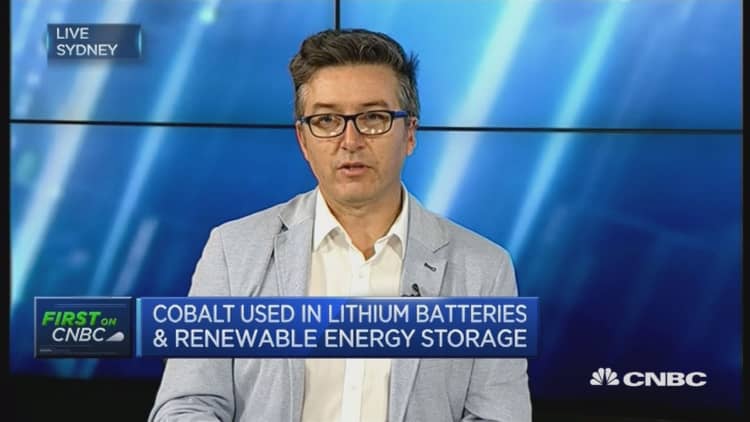
Western Australia-based miner Ardea Resources is banking on a cobalt boom.
"We have one of the world's largest cobalt deposits sitting there in Western Australia, just outside of Kalgoorlie," Matt Painter, CEO of Ardea Resources, told CNBC's "The Rundown."
Cobalt is a key element in lithium battery production. Previously seen as a byproduct of nickel and copper mines, the resource is now used in phones, computers, electric and hybrid vehicles and solar power storage systems.
"The cobalt price is really booming and it's for very good reason. With Lithium-ion batteries, one of the main components is actually the cobalt, more-so than the lithium," he added.
"The revolution that is going on in the auto industry is absolutely incredible — we can see that we can feed into that."
Cobalt prices have more than doubled since the start of 2016, tied to the potential boom in electric vehicles and smartphones. On Wednesday, Cobalt on the London Metal Exchange was trading at about $56,000 per tonne — from less than $52,000 in early March.
The rapid price rise has prompted a slew of junior Australian mining companies like Ardea Resources to express an interest in previously uneconomic cobalt deposits.
The shifting supply and demand dynamics underpin the company's base case for attempting to commercialize the resource. It's banking on an anticipated increase in demand for cobalt, as electric vehicles become more commonplace in developed economies.
It's also factoring in the potential to see supply issues out of the Democratic Republic of Congo (DRC) where 60 percent of global cobalt supply is currently sourced. Political instability and workplace issues such as child labor may make it an unsavory source, some argue.
"Suppliers want a clean supply, they need to know where it's coming from and they need it reliably. We're not sure that the DRC can deliver that, so we want to position ourselves to take advantage of that and become a clean, ethical supplier of cobalt metal," Painter said.
The company is developing a pathway to commercialize its cobalt operations. Cobalt-focused drilling at its Kalpini deposit commenced in late March with the goal of providing additional data.
"We are engaged with our pre-feasibility study, and we expect that to be completed by January in 2018," Painter said.
"Following on from that, we'll move into a more definitive feasibility-type study which will define the absolute parameters of the mine and what we would hope to get going."
The company told investors in its IPO prospectus that there is no guarantee that if exploration extends the current resources, they will be capable of sustaining commercial development.


